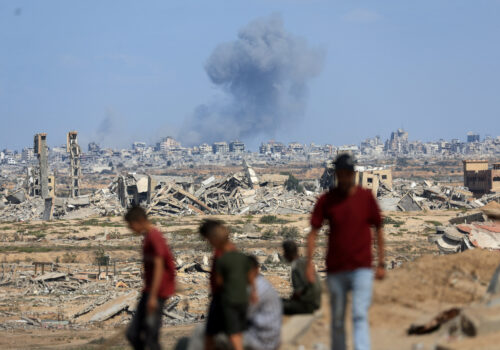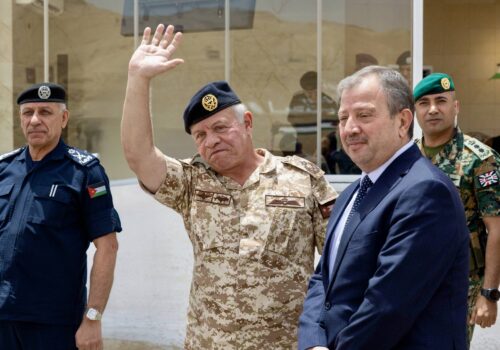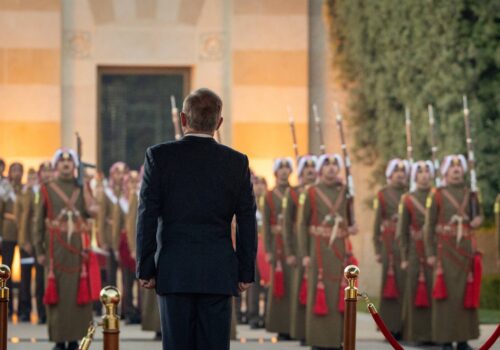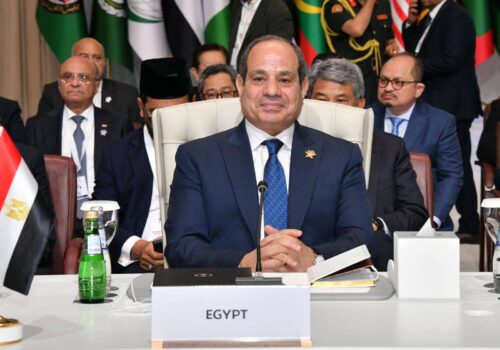Can the Jordan-Israel peace treaty survive damage done from the Gaza War?
The 1994 peace treaty between the Hashemite Kingdom of Jordan and Israel is facing a reckoning—with longstanding public anger increasing into pressure on Amman to revoke the landmark agreement.
The moment is coming as—despite Amman’s defense of the treaty through many public statements—the government grapples with its concerns about Israel’s conduct during the Gaza war, and its plans for the future of the Occupied Palestinian Territories. Now, with the announcement of a phase one cease-fire deal agreement for Gaza, significant questions remain about post-war governance and strategy in Gaza, and what that means for Israel’s neighbors.
Absent a strategic pivot from Jerusalem—which may be coming imminently if the parties can implement US President Donald Trump’s twenty-point proposal to end the war—there is a chance that Israel may be approaching a point at which it can do real damage to its pre-Gaza war relationships, particularly with Jordan.
Related Reading
A spike in public anger
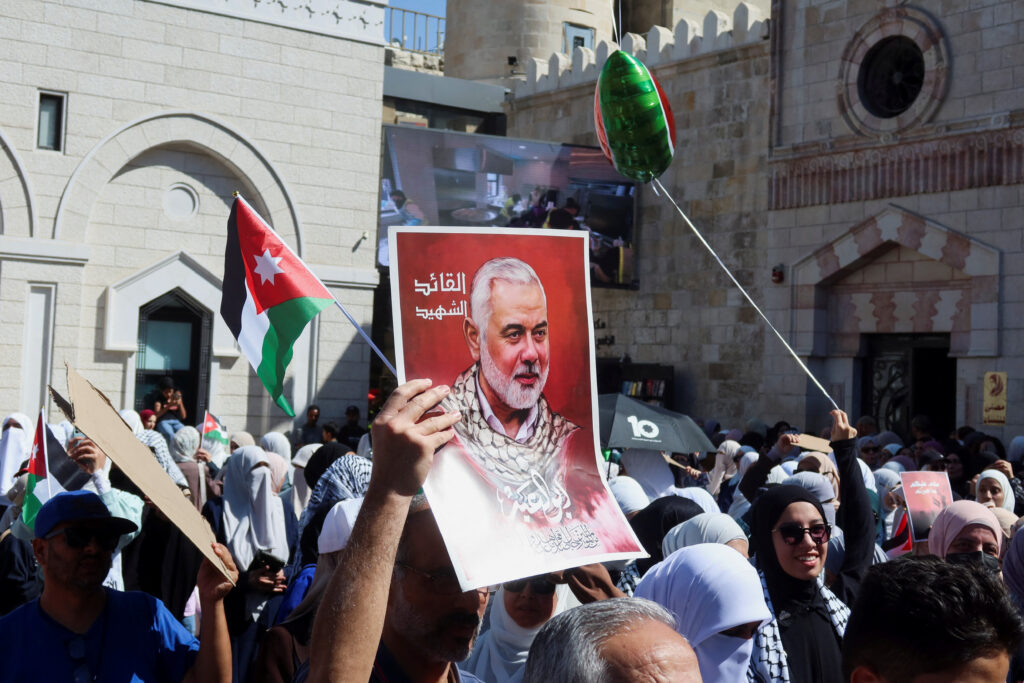
A consistent majority of Jordanians oppose the treaty and any relations with Israel or business with Israeli companies.
Apart from over 400,000 Palestinians who reside in refugee camps within Jordan, a majority of people in Jordan are of Palestinian origin—tracing their lineage to Palestinians who escaped the 1948 to 1949 Nakba (catastrophe), or Israel’s independence war. Others were expelled by Israel during the same conflict. Yet more Palestinians fled to Jordan when Israel captured the West Bank in 1967. Daily violence in the Occupied Palestinian Territories is an obvious reminder of what many Palestinian-Jordanians endured in conflicts with Israel.
SIGN UP FOR THIS WEEK IN THE MIDEAST NEWSLETTER
A 2023 public opinion survey in Jordan indicated that a plurality of Jordanians perceive Israel to be “the entity that poses the greatest threat to the security of the Arab world.” And there have been significant anti-Israel demonstrations in Jordan in response to the ongoing Gaza conflict that demonstrate such sentiments.
Moreover, there has been a significant increase in pro-Hamas sentiment in the country—from 44 percent in 2020 to 85 percent in 2023, shortly after the Gaza war had started—which has triggered concern in Amman about possible security incidents.
In April of this year, Jordanians gathered after Friday prayers in Amman in solidarity with Palestinians in Gaza. Participants, including some covering their faces as Hamas leaders usually do, expressed strong opposition to Israeli military action. In May 2024, pro-Palestine demonstrators descended on downtown Amman multiple times to protest Israel’s conduct of the Gaza war. The May 24 demonstration was one of the largest in Jordan, according to research published by the Rosa Luxemburg Foundation, showcasing the depth and intensity of public rage. Previously, in March 2024, authorities had to break up a demonstration near the Israeli Embassy in Amman using batons.
There are no reliable estimates on the exact sizes of demonstrations—Jordanian authorities have no incentives to publish any numbers. On the other hand, demonstration organizers may tend to exaggerate the numbers to exert pressure on the government. My review of English and Arabic language media articles suggests that demonstration turnout could span anywhere from two thousand to ten thousand people.
Amman’s response through the war
The war’s displacement of most Gazans within the strip, its near-total destruction of the strip’s infrastructure, and Israeli leaders’ advocacy of transferring Palestinians to other countries have put Amman in a difficult situation. Jordan’s leaders are characterizing forced displacement of Palestinians as destabilizing and a war crime. Shortly after the start of the war, then Jordanian Prime Minister Bisher Khasawneh indicated Amman’s belief that displacement of Palestinians would “threaten Jordan’s national security.” Moreover, in September 2025, the Jordanian Ministry of Foreign Affairs condemned the displacement of Palestinians to other countries as a “flagrant violation” of international law and principles.
But Jordanian leaders’ public statements frame the treaty as not only a legal obligation, but also as an agreement and an overall relationship that provides Amman with certain benefits. Those benefits are substantial, including custody of Muslim holy places in Jerusalem, sovereignty over previously disputed land, water sharing rights in the Jordan and Yarmouk rivers, a formal role in discussions on Palestinian refugees, and Israeli provision of natural gas. These would be at risk if the treaty were abandoned.
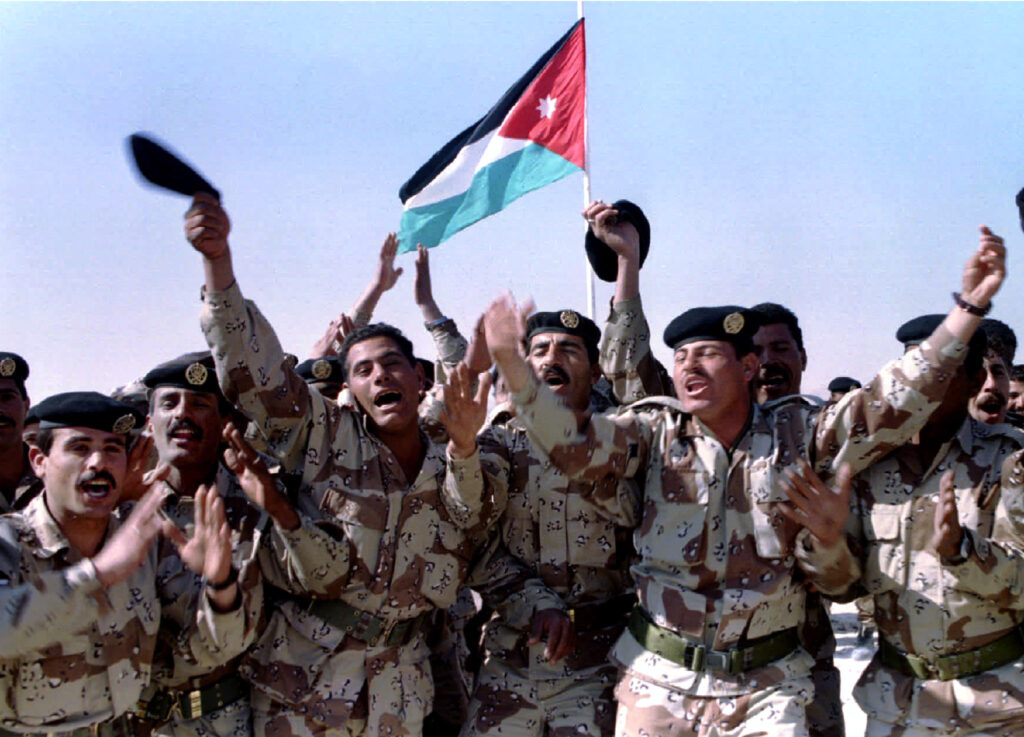
Jordanian officials are concerned that Israeli government rhetoric and policies—settlement expansion, annexation plans, displacement of 90 percent of Gaza’s Palestinians, and persistent settler violence in the West Bank—might boost popular Jordanian opposition and threaten the treaty’s viability.
As early as November 2023, Khasawneh called the expulsion of Palestinians from the Occupied Palestinian Territories a “red line” that constitutes a fundamental violation of the treaty. He highlighted the treaty’s provision prohibiting forced population movements, arguing that such displacement would threaten Jordan’s national security. All of Jordan’s top leaders, including King Abdullah II and senior government ministers, have spoken publicly against forced displacement.
It is likely that the Jordanian government is concerned about the public reaction if Israel expelled Palestinians out of the Occupied Palestinian Territories into Jordan; such a step could endanger the monarchy or force Amman to take more direct anti-Israel steps, such as suspending the treaty. Separately, Jordan lacks the resources, particularly water, to host even more refugees, and the resultant stress Palestinian refugees would place on the country’s economy could be dangerous for Amman, aside from the obvious political considerations.
That said, the Jordanian government has restricted protests in support of Gaza, including the flying of the Palestinian flag, according to Amnesty International. Foiling a plot to commit armed attacks in the country, Jordanian security forces arrested sixteen suspects, some of whom confessed to being members of the Muslim Brotherhood, the transnational organization from which Hamas is descended. Officials did not publicly name specific buildings or locations the suspects planned to hit. They said the cell was preparing rockets and drones for attacks “inside the kingdom.”
Amnesty International has also documented Jordanian authorities arresting and jailing protestors simply for demonstrating against the Gaza war, and for peacefully opposing Amman’s policies vis-à-vis Israel. Since October 7, 2023—when Hamas rampaged through southern Israel, killing over 1,200 mostly civilian Israelis—Jordanian authorities have arrested at least 1,500 people, with about five hundred detained since the March 2024 protests outside the Israeli Embassy in Amman.
Relationships on the world stage
Citing the king’s longstanding support for a two-state resolution of the Palestinian-Israeli conflict, Khasawneh backed-up Cairo’s recent rejection of displacing Palestinians from the Gaza Strip into Egypt, fearing a precedent for a similar expulsion from the West Bank into Jordan. There have been a few Israeli proposals discussed through the war that concerned the Jordanians: Israeli Defense Minister Israel Katz’s “humanitarian city,” which opponents characterize as an internment camp, Prime Minister Benjamin Netanyahu’s “voluntary migration,” and the forced migration proposed by other Israeli officials.
It is noteworthy that Jordan is the only Arab state with a peace agreement with Israel that has recalled its ambassador from Tel Aviv and expelled Israel’s ambassador since the Gaza war began. Moreover, Jordan indicated that it would not accept any Israeli attempt to return an ambassador to Amman.
Well-publicized Israeli admissions of potential impropriety, such as former chief of staff Herzi Halevi’s assertion that Israeli military units “took the gloves off” and ignored legal advice in conducting their Gaza operations, are likely to further stoke popular anger in Jordan and across the wider Arab world.
Although it is unlikely to yield any decisive action, Jordan participated in a recent Arab League and Organization of Islamic Cooperation discussion in Doha that was called after Israel’s September strike on Qatar’s capital. The gathering explored the idea of applying diplomatic consequences on Israel, and Article 15 of the final communiqué calls on all Arab and Muslim states to sanction Israel and review “diplomatic and economic relations” with it—something that would have been unimaginable prior to the Gaza war.
Halevi’s estimate that casualties in Gaza—killed and wounded—amount to more than 10 percent of the strip’s population (over 200,000) tracks closely with the Palestinian Ministry of Health’s ongoing count of casualties, which Israel had previously dismissed as Hamas propaganda. This should further anger opponents of the Gaza war in Jordan.
Israeli activities elsewhere in the region also serve to amplify Jordanian anger. Israel justifiably retaliated when attacked by the Houthis from Yemen and Hezbollah from Lebanon. But the Israeli military continues to hold positions and conduct attacks in Lebanon even after a cease-fire was negotiated and implemented.
Jordanians, although divided about Hezbollah, opposed Israeli actions in Lebanon.
The Israelis also conducted attacks against Syrian military targets as soon as Bashar al-Assad’s regime fell last year. Over the summer, they also carried out attacks against forces and installations of Syria’s new government, on claims of defending of the Druze minority. The skirmishes prompted the Jordanian foreign ministry to issue condemnatory statements.
In the aftermath of Jerusalem’s failed attempt to assassinate Hamas senior political leaders in Doha last month, Amman’s Foreign Ministry joined in popular condemnation, affirming the kingdom’s “absolute” rejection of the attack, adding that the strike constituted a violation of the sovereignty of an Arab state and a “dangerous and unacceptable provocative escalation.”
What’s next
In short, expulsion of Palestinians from the Israeli-occupied territories has emerged for Amman as an inflection point, potentially altering Amman’s relationship with Israel. As questions still loom about post-war Gaza strategy, it is highly unlikely Jordan’s leaders would be able to contain domestic anger should Palestinians be forced onto Jordanian or Egyptian territory.
Much like the United Arab Emirates’ warning that Israel’s annexation of the West Bank would prompt a reversal of Jerusalem’s integration into the region, Amman likely would be forced to reverse at least some elements of its own relationship with Israel, if it perceived Jerusalem had violated the treaty clause related to forced displacement.
Given the extreme destruction of Gaza’s infrastructure, including religious, educational, and medical facilities, it is highly unlikely Jordanian leaders—or their public—would see any sizable number of “voluntary” departures as, in fact, voluntary. Aid groups have argued that Israel’s continued war has made the strip dangerous and uninhabitable. It would not be a leap to argue the war is intended to incentivize many Palestinians to leave and to convince Arab states to accept them. Even US leaders—including chief among them, Trump and his Secretary of State Marco Rubio—have questioned why anyone would want to remain in Gaza.
The decisions made in coming days will help determine the extent to which Israel’s conduct during the Gaza war and its other military operations in the region have pushed important alliances to the brink.
Amir Asmar is a nonresident senior fellow with the Scowcroft Middle East Security Initiative at the Atlantic Council’s Middle East programs. He is also an adjunct instructor of Middle East strategic issues at the National Intelligence University.
Further reading
Tue, May 27, 2025
Jordan-Israel security cooperation continues quietly but unabated
MENASource By Emily Milliken
Despite diplomatic setbacks from the Israel-Gaza war, military and intelligence cooperation continues to thrive between the two neighbors.
Wed, Jun 25, 2025
Why King Abdullah’s rule in Jordan has endured despite turbulence
MENASource By
With a struggling economy, little oil, and surrounded by wars, how has Abdullah remained in power for more than a quarter century?
Thu, Oct 9, 2025
Amid Gaza cease-fire hope, where does the Egypt-Israel relationship stand?
MENASource By Shahira Amin
Israel’s Doha strike shifted the dynamics with Cairo—stemming from concerns that Egypt may be next in Israel's crosshairs.
Image: Jordan's King Abdullah II (R) greets Israeli Prime Minister Benjamin Netanyahu, as leaders gathered to deliver a joint statement on Middle East Peace talks in the East Room of the White House in Washington September 1, 2010. REUTERS/Jason Reed (UNITED STATES - Tags: POLITICS)
